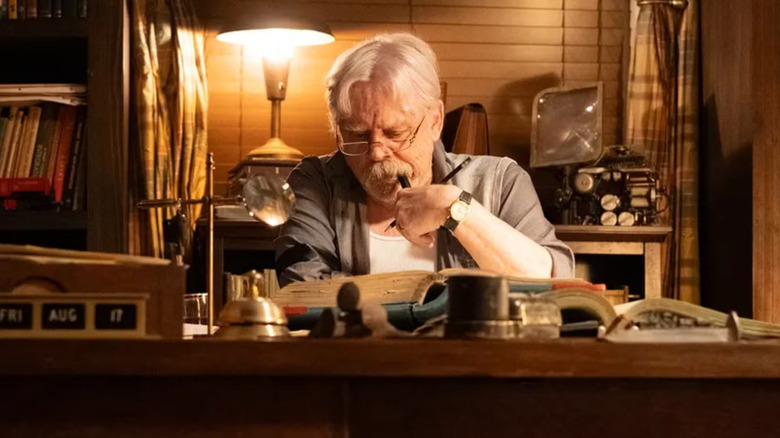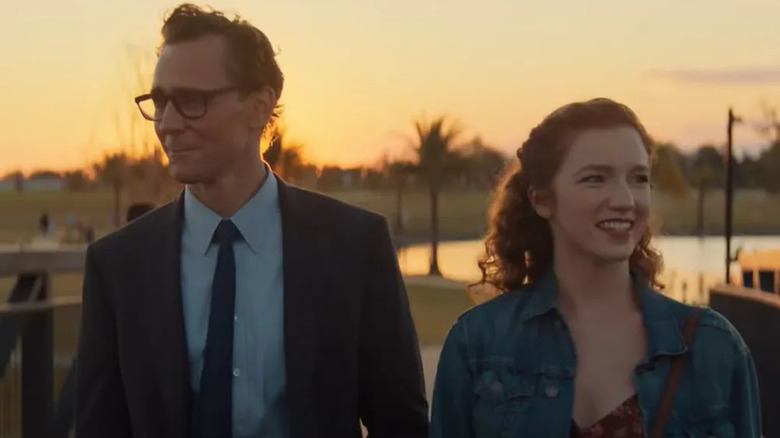The Life Of Chuck Review: Stephen King's Novella Becomes Mike Flanagan's Empathetic Opus
There exists a pushback against a recent trend dubbed "hopecore," a cultural meme seen on social media platforms (mostly Tik Tok) which accentuates the positive. The reasons for this backlash are several, of course. Those who consider themselves realists believe that such rampant positivity can be toxic. It certainly doesn't help that so many popular sentiments regarding humanity's interconnectivity have been reduced to phrases printed on throw pillows and door mats that you can buy at Target. In an era where so many feel that to be positive is to be willfully ignorant, the notion that things can (or even might) work out alright feels like an empty platitude.
No single work of art can turn a pessimist into an optimist or vice versa, but the power of art can certainly address both the macro and the micro in an attempt to reconcile them. Movies, as Roger Ebert once said, are empathy machines, and as much as they can function as such for audiences learning to empathize with other people than themselves, cinema can also turn that empathy back toward the audience. "The Life of Chuck," the latest from filmmaker Mike Flanagan, is suffused with empathy for humanity, a quality that's been a staple of Flanagan's entire filmography (yes, that includes his horror movies and shows). Yet this is not a movie looking to placate people with empty sentiment, nor is it a film espousing the simple heroism of the underdog. It's not hopecore, and it's not Frank Capra, in other words.
Instead, "The Life of Chuck" is one of the most insightful and moving philosophical films ever made, a movie that's as much Kierkegaard as it is King. It might actually be Stephen King doing Kierkegaard, given that its unique structure (which is reminiscent of a Christopher Nolan movie) is adapted verbatim from the author's novella. That said, Flanagan and his ensemble cast make the film their own, telling a tale that seeks to balance the macro with the micro and act as a cinematic equivalent to the idiom of a glass that's either half full or half empty.
The Life of Chuck is a stealth anthology
A large part of the magic that makes up "The Life of Chuck" lies in how the story is structured and told, so I won't spoil too much here. Suffice to say that, like the novella, the film is told in three chapters that occur in reverse chronological order, and all three concern Charles "Chuck" Krantz, a lovable if average man who works as an accountant.
In the first chapter (which is really the third chapter, if you follow me), Chuck (played by Tom Hiddleston) begins appearing on various billboards and ads while the world is seemingly steadily headed for the apocalypse, a mystery that schoolteacher Marty (Chiwetel Ejiofor) and nurse Felicia (Karen Gillan) are trying to find an answer to. In the second chapter, Chuck comes across a drummer (Taylor Gordon) busking on the street whose music inspires him to drop everything and dance, an improvised moment where he's joined by a recently jilted girl (Annalise Basso). Then, in the final chapter (which is the first), Chuck grows from a young boy to a teen (played by Cody Flanagan, Benjamin Pajak and finally Jacob Tremblay), learning some tricky lessons about life along the way. Amongst these lessons is a very King-esque one, involving Chuck's grandfather Albie (Mark Hamill) warning him to never enter the attic, because it might have the power to depict the death of someone close to you, including yourself.
As you can see, even though "The Life of Chuck" is ultimately a parable with the same character at its center, it functions more like an anthology film. Flanagan, being a horror film veteran, is undoubtedly aware of the tradition of portmanteau movies within the genre, and though he doesn't necessarily switch up his style for each segment, he certainly varies the tone with pleasing variety. The first segment is suffused with creeping dread, the second is bittersweet, and the third blends coming-of-age tenderness with supernatural wonder, a combination worth of Spielberg or Serling. There's something appealingly "Twilight Zone"-like about the film overall, with Flanagan transmuting King's blue collar romanticism into Serling-esque common man poetry.
Although each segment works perfectly as its own individual short, the combination of the three together — once put in the correct order by the viewer, for the film does not hold anyone's hand in this fashion — has a cumulative effect, making the movie the second film to release on June 6 of this year that pushes the anthology film forward (the other being "Predator: Killer of Killers").
Flanagan keeps a very steady hand on the wheel, which allows for alienation to creep in
The ambition on display in "The Life of Chuck" never feels too weighty, yet it still requires Flanagan to thread a needle with delicacy. He's done it before, as with "Oculus" and its parallel timelines, and in "Doctor Sleep," which seemingly did the impossible in its reconciling of the disparate visions of "The Shining" by King and Stanley Kubrick. Despite the reverse structure and several mysteries that lay within "Chuck," Flanagan impressively seems unbothered. Even though the film features the dulcet tones of Nick Offerman as a folksy, omniscient narrator, there's never an attempt to blatantly spell out what's happening and why. Flanagan doesn't have to; he plays fair with the audience, giving them all the answers, even if they have to wait a little while so they can put the puzzle pieces together themselves.
Flanagan's secret weapon, as always, is his earnestness, which is a quality that we don't see much of in cinema these days, let alone mainstream American cinema. That's partially due to the changing times, of course: if a movie like 1989's "Field of Dreams" were released today, its numerous charms and heart would very easily get drowned in a sea of Discourse, both due to the toxicity of social media and the cloud of irony poisoning that we've been breathing in almost since the turn of the century. Though he can certainly be accused of wearing his heart on his sleeve (and letting himself and his actors indulge in monologuing), Flanagan innately understands what kind of audience he's making a movie for, and he never lets "Chuck" tip into total cynicism or saccharinity. Thus, it could be said that "Chuck" lingers in the middle too much for too long, being too sweet for some and too off-putting for others. The film is equal parts intellectual and emotional, something which continues to pay dividends after it's over (or upon rewatches), but has the potential to make the film feel alienating while it's unspooling. Flanagan has taken a risk in making his cinematic glass half-full (or half-empty) of water, and as such, one's response to the movie depends a bit more than usual on what you're bringing to it.
The Life of Chuck is proof that Flanagan and King, like anyone, contain multitudes
To anyone familiar with the work of Flanagan and King, "The Life of Chuck" shouldn't come as a huge surprise. Sure, both men are more famous for their works of terror, but the heart that they've demonstrated in works like "The Haunting of Hill House," "Midnight Mass," "The Shawshank Redemption," "Stand By Me" and others means that their range is not a newly discovered thing. Yet to someone like me, who's a lifelong fan of both artists, there was still revelation within "Chuck." For the first segment of the film, Flanagan elicited a kind of fear within me that I didn't realize I possessed, while the story's structure showed me that King has more inventiveness than perhaps I gave him credit for.
The most compelling aspect of "The Life of Chuck" is the way it deepens and mirrors so many themes and concepts found in cinema and in real life. It tells a tale of "amor fati" which feels like a kinder flip side to how the idea can be used in a horror context, such as it was in last winter's "Nosferatu." It speaks to loss as something both momentous and ordinary, because of course, that's precisely what loss is. I lost my grandmother earlier this year; the film is dedicated to the late Scott Wampler, a man I knew personally if only as an acquaintance. Yet where some deal with loss and the specter of death as a lamentable void, it can also feel like these loved ones are never completely gone, that their lives made impacts of varying size, and the size hardly matters. This leads to a warm feeling of acceptance, and that's the conclusion which "Chuck" comes to, whether it's about death or the way one has lived their life. It's not to be feared as horrific, it's not to be embraced as beautiful, it just is. When it comes to "The Life of Chuck" being the most thoughtful, empathetic, and tender film of the year, it just is.
/Film Rating: 9 out of 10
"The Life of Chuck" opens in select theaters on June 6, 2025, and wide on June 13, 2025.



